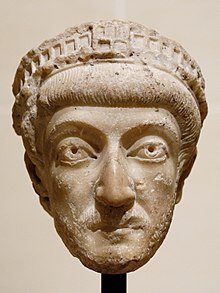Spoke 5: The Biblewheel and The 5th Century
(Go back to main Menu)
Theodosius II and his law
The Byzantine Emperor Theodosius II was known for the Theodosian law code. Deuteronomy has two meanings: a second law or a repetition of the law, which seems more appropriate because the first generation who went out from Egypt died in the wilderness for their lack of taking a stand in their faith. But their children whom they feared would fall prey to the Canaanites, heard this law and entered and conquered the land of Canaan under Joshua. Therefore what was repeated to their children is written in Deuteronomy:
Theodosius II (Latin: Flavius Theodosius Junior Augustus;[1] Greek: Θεοδόσιος Βʹ; 10 April 401 – 28 July 450),[2] commonly surnamed Theodosius the Younger,[3] or Theodosius the Calligrapher, was the Eastern Roman Emperor for most of his life, taking the throne as an infant in 402 and ruling as the Eastern Empire’s sole emperor after the death of his father Arcadius in 408. He is mostly known for promulgating the Theodosian law code, and for the construction of the Theodosian Walls of Constantinople. He also presided over the outbreak of two great Christological controversies, Nestorianism and Eutychianism.
https://en.wikipedia.org/wiki/Theodosius_II
https://en.wikipedia.org/wiki/Codex_Theodosianus
(Go back to main Menu)
Theodosius II and his law
The Byzantine Emperor Theodosius II was known for the Theodosian law code. Deuteronomy has two meanings: a second law or a repetition of the law, which seems more appropriate because the first generation who went out from Egypt died in the wilderness for their lack of taking a stand in their faith. But their children whom they feared would fall prey to the Canaanites, heard this law and entered and conquered the land of Canaan under Joshua. Therefore what was repeated to their children is written in Deuteronomy:
Theodosius II
Theodosius II (Latin: Flavius Theodosius Junior Augustus;[1] Greek: Θεοδόσιος Βʹ; 10 April 401 – 28 July 450),[2] commonly surnamed Theodosius the Younger,[3] or Theodosius the Calligrapher, was the Eastern Roman Emperor for most of his life, taking the throne as an infant in 402 and ruling as the Eastern Empire’s sole emperor after the death of his father Arcadius in 408. He is mostly known for promulgating the Theodosian law code, and for the construction of the Theodosian Walls of Constantinople. He also presided over the outbreak of two great Christological controversies, Nestorianism and Eutychianism.
| Theodosius II | |||||||||
|---|---|---|---|---|---|---|---|---|---|
| Emperor of the Eastern Roman Empire | |||||||||

Bust of Theodosius II
| |||||||||
| Emperor of the Roman Empire | |||||||||
| Reign | January 402 – 1 May 408 (with Arcadius); 1 May 408 – 28 July 450 (alone, with Anthemius and later Pulcheria acting as regent from 408 to 416) | ||||||||
| Predecessor | Arcadius | ||||||||
| Successor | Marcian | ||||||||
| Co-emperors | Arcadius (402-408) Pulcheria (414-450) Honorius (Western Emperor, 402-423) Valentinian III (Western Emperor, 423-450) | ||||||||
| Born | 10 April 401 | ||||||||
| Died | 28 July 450 (aged 49) | ||||||||
| Wife | |||||||||
| Issue | Licinia Eudoxia | ||||||||
| |||||||||
| Father | Arcadius | ||||||||
| Mother | Aelia Eudoxia | ||||||||
https://en.wikipedia.org/wiki/Theodosius_II
Codex Theodosianus
The Codex Theodosianus (Eng. Theodosian Code) was a compilation of the laws of the Roman Empire under the Christian emperors since 312. A commission was established by Theodosius II and his co-emperor Valentinian III on 26 March 429[1][2] and the compilation was published by a constitution of 15 February 438. It went into force in the eastern and western parts of the empire on 1 January 439.[1]
Development
On March 26, 429, Emperor Theodosius II announced to the senate of Constantinople his intentions to form a committee to codify all of the laws (leges, singular lex) from the reign of Constantine up to Theodosius II and Valentinian III. Twenty-two scholars, working in two teams, worked for nine years starting in 429 to assemble what was to become the Theodosian Code.[3] The chief overseer of the work was Antiochus Chuzon, a lawyer and a prefectand consul from Antioch.[4]
Their product was a collection of 16 books containing more than 2,500 constitutions issued between 313 and 437. John F. Matthews illustrated the importance of Theodosius' code when he said, "the Theodosian Code was the first occasion since the Twelve Tables on which a Roman government had attempted by public authority to collect and publish its leges."[5] The code covers political, socioeconomic, cultural and religious subjects of the 4th and 5th centuries in the Roman Empire.[6]
https://en.wikipedia.org/wiki/Codex_Theodosianus
![Biblewheel: A wise king scattereth the wicked, and bringeth the wheel over them. [Pro 20:26 KJV]](https://blogger.googleusercontent.com/img/b/R29vZ2xl/AVvXsEgiFT6-YCyrSoMjVlsXjQIWJVHaMXsChgqmAIk9mLeNmsgqWXD94k5TOPejvnORdnQ39OL3U4FleKWbC1r46q2t5nYnipb_qDZFNHQR_YXesnm6ucYt2g1DjbBhXnZmML3IHhunsYSeRBU/s1600-r/biblewheel_traced_edited.png)
No comments:
Post a Comment